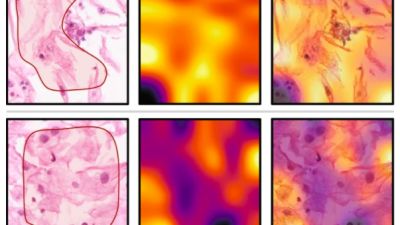Cambridge researchers use artificial intelligence to help detect early stage cancer

Researchers at the University of Cambridge have used artificial intelligence to help identify suspected cases of a condition which could lead to oesophageal cancer.
It is hoped using the new technique could eventually lead to faster, earlier diagnoses of the disease.
The new research by the university's CRUK Institute analysed samples obtained using the ‘pill on a string’ diagnostic tool Cytosponge.
The Cytosponge is about the size of a ten-pence piece. Patients swallow it in a pill, which then dissolves in the stomach releasing a sponge on a string. The sponge is then pulled out, collecting cells from the gullet and throat on the way back back which can then be analysed for signs of cancer.
Professor Rebecca Fitzgerald from the MRC Cancer Unit at the University of Cambridge, who developed the Cytosponge and worked with the AI team, said:
Using the new AI algorithm, researchers found it was capable of significantly reducing the workload of pathologists, while importantly being just as accurate.
This is a difficult area to master. In Janelle Shane's book about Artiticial Intelligence 'You Look Like A Thing and I Love You' she cites the example of Stanford University - who were training an AI to spot tumours:
14-year-old from Luton writes rap to encourage young people to open up about their wellbeing
No Ifs, No Butts: New campaign raising awareness of bowel cancer
Early diagnosis of cancer is vital as is it improves the patient's survival outcomes. Oesophageal cancer is the sixth most common cause for cancer-related deaths, the five-year overall survival can be as low as 13%.
It's hoped the new technology could help reduce the need for invasive biopsies by 35%.
The new study looked at a condition known as Barrett oesophagus, in which cells in the lining of the oesophagus change shape. It is common in patients with Gastro-oesophageal Reflux Disease (GORD), a digestive disorder where acid and bile from the stomach return into the oesophagus leading to heartburn symptoms.
Dr Florian Markowetz from the CRUK Cambridge Institute, who led the work on the AI algorithm, said:
The study, which was supported by Cancer Research UK, the Medical Research Council and Cambridge University Hospitals NHS Foundation Trust, has been published in Nature Medicine.
The Government sees AI as an important weapon in helping with earlier diagnosis. Back in 2018 it announced it was giving £50m to set up five new medical technology centres to explore ways in which the NHS could utliise AI.
At the time West Suffolk MP and Health secretary Matt Hancock said:
It's the latest way in which researchers have used artificial intelligence to detect cancers. Last year a team including Cambridge-based Cancer Research UK developed an AI programme which can detect breast cancer from mammograms.